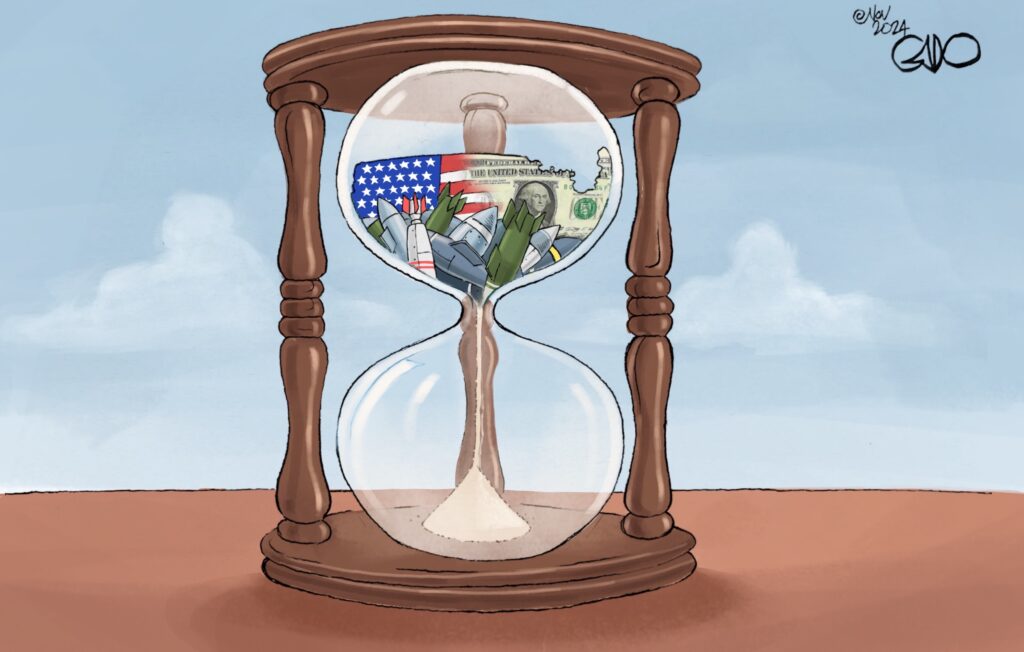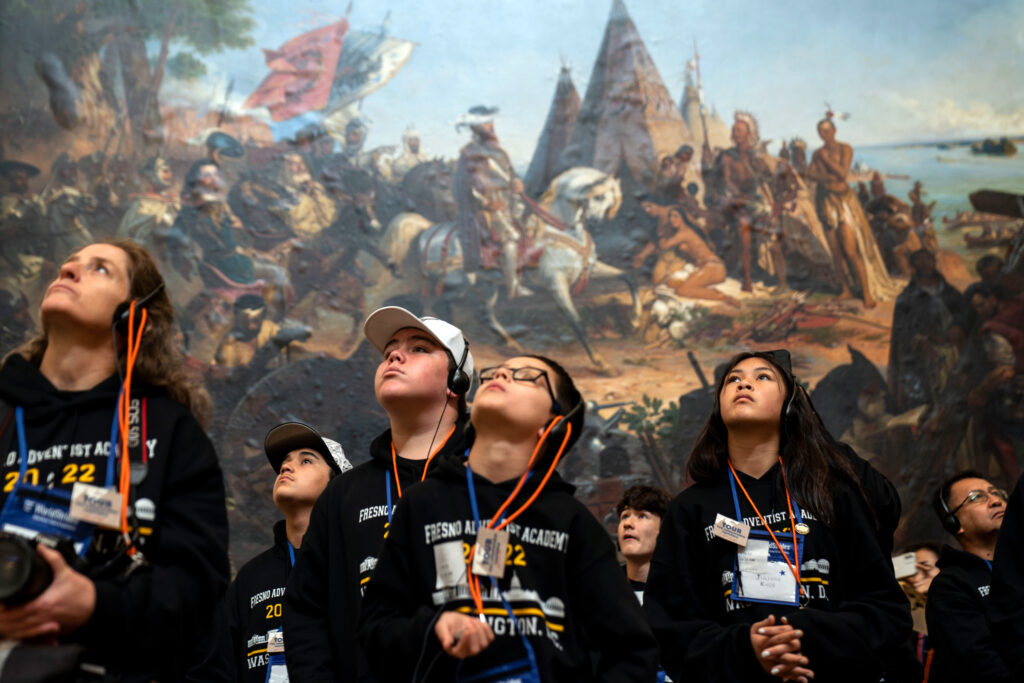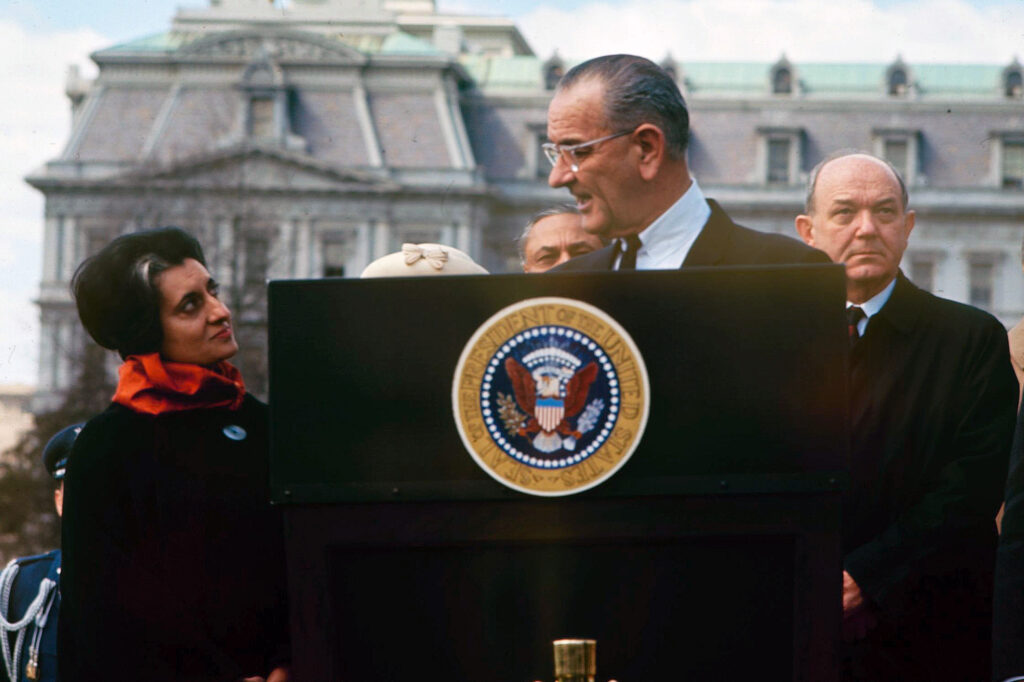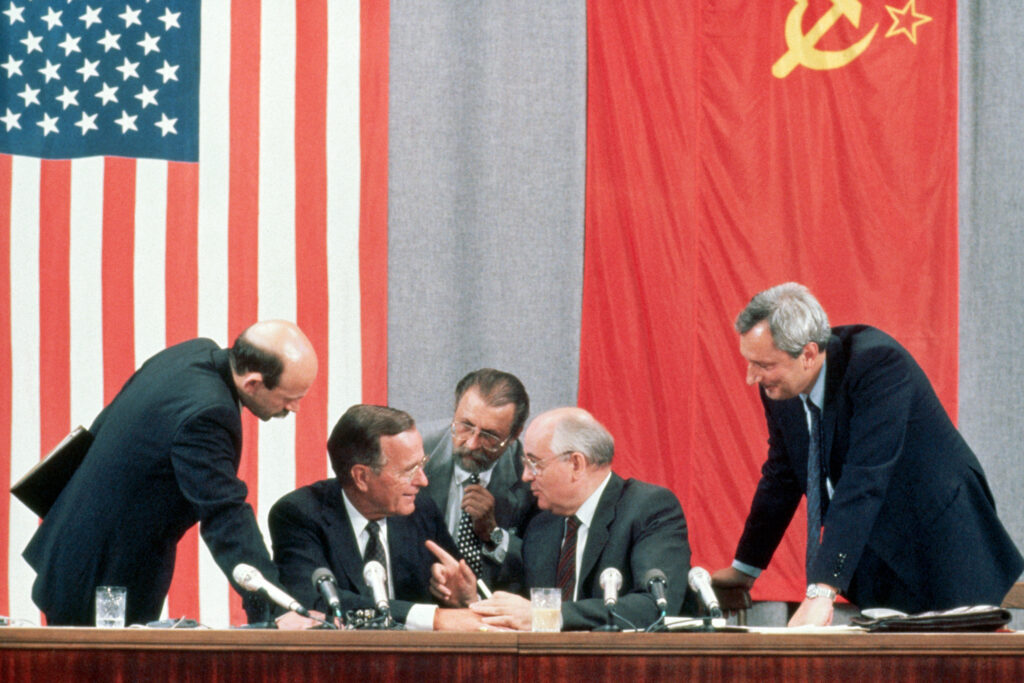Is America in decline? As always, it depends on whom you ask—for some the slope seems to get steeper every day. Global catastrophes from Ukraine to Gaza certainly point to the diminishment of U.S. power and influence. The notion that the U.S. had the wherewithal to remake countries in its own image, that strange conceit of neoconservatism, is now a fever dream in the dustbin of history. The allure of these United States, once pervasive, has been reconsidered by a world no longer dominated by a unitary West, one that reaches toward a different vision of multipolar power sharing. And while polarization is a global phenomenon, exacerbated to be sure by populist entrepreneurs, its affliction is particularly profound and enduring in the American context.
Yet when one looks elsewhere, the idea that American institutions are weakening seems baffling. The forces of the economy, security, and defense, not to mention cultural power, are hardly absent in the U.S. condition, and in some ways grow vaster. The notion that the U.S. promotes democracy is weather beaten, if not downright risible (as is hope for the health of democracy chez Trump’s America), but technology generally, financial sectors across the spectrum, professional sports and Tinseltown film continue to hold sway by any reasonable measure.
The question of whether America is in decline is a hoary, though crucial, one long asked in many quarters. At The Ideas Letter, we are committed to steering clear of any reductive or establishment-type analysis. We asked a cross-section of writers, academics, and intellectuals to share reflections from their home base geography. This locks into the guiding geist of The Ideas Letter: How we can envision and interpret the world through the prism of the world itself, rather than via a few preset power-centers. How can we ensure that issues of global importance—whether climate, inequality, democracy, the Right—are deliberated on as issues germane to all and thus open to global debate? That’s also how we conceived of this Ideas Letter that launches the website.
For the launch of our new website, we’re publishing ten original and illuminating essays that take on the implications of American decline from a global perspective. We asked our authors to run free, and resist rigid approaches: Some took a conceptual look at the question; others focused on historical forces that drive the present condition; still others chose particular political moments that have defined and redefined how best to approach the problem.
The eminent international relations scholar Stephen Walt leads off with a wide-tent consideration of the issues at stake in the debate. Despite his synoptic lens, Walt’s views on decline are clear if you read him closely. Iza Ding follows with a view of China in which dynastic dialectics are foregrounded, and the notion of rise and fall as purveyed by Gibbon is shred apart.
Domiciled currently in his hometown of Srinagar, the Kashmiri writer and editor Basharat Peer provides a matchless analysis of America in the historical Indian imagination (and, poignantly, in his own). We then turn toward Lee Siegel, the great American cultural and social critic, to appraise the intellectual forces at play within a corroded and contradictory American context.
Writer Ursula Lindsey, based in Amman, brings a critical view on recent events into sharp focus on the Middle Eastern canvas, raising some necessary and difficult questions.
Turning toward a view from Mexico, Natalia Saltalamacchia, a scholar of long standing at Mexico City’s Instituto Tecnológico Autónomo de México (ITAM) considers whether Mexico can ever truly break free of El Norte, and what a loosely configured new non-alignment might even mean. Lagos-based analyst Cheta Nwanze is next up and discusses how this new multipolar moment risks reviving the unresolved legacy of colonialism. Nwanze isn’t particularly sanguine about what American decline means for the continent.
Hans Kundnani, a seasoned observer of the European scene, looks at some of the defining characteristics of decline and draws spirited conclusions about how Europeans may be grappling with the question. That Europe’s fate and future is wrapped up in America’s is central to Kundnani’s retelling.
Next is a perspective on Russia from one of the country’s greatest analysts now living abroad, Kirill Rogov. Rogov traces the Russian perspective on America over the post-Soviet period and arrives at some unanticipated conclusions. We end with a view from Brazil: Fernanda Magnotta, an IR scholar in São Paolo, walks us through the curious features of her country’s strategic autonomy and pragmatic foreign policymaking vis-a-vis the West and the U.S.
The Ideas Letter was founded a year ago to spotlight newly authored essays and curated pieces on themes germane to the work of its home: The Ideas Workshop at the Open Society Foundations. We are eager to showcase pieces that cut against received wisdoms, ask questions typically un-queried, and raise uncomfortable, often heterodox positions.
You’ll see that we wonder about whether America is in Decline; it is a question—not an assertion. Some may have observed last week’s U.S. election results and have arrived at a firm point of view about the (un)health of the American polis. Others will hesitate to draw lazy or pat conclusions—we count ourselves among them.
All countries go through some form of decline. It may happen suddenly or over a lengthy period; it may be catalyzed by war or some external shock; it may be a result of overreach or, for that matter, underreach. Power is never a constant; it will always be predicated on institutional strength, military might, economic dominance, and cultural hegemony. Central for us is how it is perceived around the globe, and we hope this issue provides that searching lens.
Our musical selection this issue is from Johnny Cash, a particular kind of American hero: a straight-talking, swashbuckling, friend of the underdog. This haunting track, “The Man Comes Around,” is the very last song he wrote. Thanks to Ideas Workshop colleague, LuHan Gabel, for suggesting the musical selection.
Last, we are honored to have an illustration from Godfrey (Gado) Mwampembwa, one of East Africa’s finest cartoonists.
Enjoy, tell us what you think, and please share with friends and foes alike.
—Leonard Benardo, senior vice president at the Open Society Foundations

Is the United States in Decline?
Does It Matter?

Stephen M. Walt
The Ideas Letter
Essay
The United States’ global power may have fallen lately relative to the power of other major states. But in many respects—geographic, economic, military, demographic—it is today, and it will remain for a while longer, the world’s leading power. And that’s what matters most. The U.S.’s (moderate) loss of influence could also be a good thing, for the U.S. and for the world, by encouraging a more restrained and cooperative foreign policy, reducing unnecessary interventions and fostering more balanced international relations. The main obstacle that stands in the U.S.’s way is the U.S. itself.
“‘There is a great deal of ruin in a nation,’ observed Adam Smith, and especially when a country is as favorably positioned as the United States is. America retains assets that most countries would envy, and those favorable conditions ensure that the United States will remain one of the world’s most important powers for many years to come. U.S. policymakers will still enjoy greater freedom of action than virtually all their counterparts, but whether they use that latitude wisely or foolishly remains to be seen. Will they use these assets to secure the country’s future and to help address a growing array of serious global problems, or will they pursue an agenda that leaves the world and the United States less stable or prosperous than it is today? Unfortunately, odds on the latter outcome rose dramatically on November 5, 2024.”
Goodbye, Gibbon

Iza Ding
The Ideas Letter
Essay
Western historiography generally understands history as a line and is preoccupied with the rise and fall of empires. In China, however, the line of history is an ever-repeating circle, with China always at its center. From a Chinese perspective, even subverters, invaders, conquerors of China somehow become Sinicized. Decline and rebirth are moral narratives within Chinese history, rather than existential threats. From the Chinese perspective, the “decline” of the United States could imply inevitable replacement or simply a divergence from Western ideals.
“When Chinese leaders muse about the decline of the West, what they are saying is that the West is no longer a model for China, however correct or incorrect this conclusion may be. When Chinese state media play footage of looting on Chicago’s Michigan Avenue or police brutality in Ferguson, Missouri, they are telling viewers that the United States is not the kind of shining city on the hill it makes itself out to be. The message is not to go help America restore social stability with Confucian values. For better or for worse, the Chinese worldview, while by no means static, is still quite particularistic, in contrast to the more universalizing worldviews of the Christian tradition.”
India and America
A Certain Ambivalence

Basharat Peer
The Ideas Letter
Essay
India has long had a love/hate relationship with American power. Prime Minister Nehru was grateful for President Roosevelt’s support of Indian independence, but nevertheless remained strongly protective of his country’s strategic autonomy in the postwar period. The Green Revolution flourished in India, while the country steadfastly resisted American pressure to get on its side during the Cold War. More currently, America’s shifting global role and contradictions in its advocacy for democratic values have diminished its influence in India.
“America evokes unparalleled desire and unparalleled envy. I was in Delhi when I found out about the September 11 attacks: sudden euphoric cries rose from several desks around me. I was a young reporter, and spending my nights trying to learn from Gay Talese, Norman Mailer, Michael Herr, and Joan Didion. I was among the few in the office who went quiet. America ceased to be invincible that morning. In its wounded fury and indiscriminate lashing out—the invasion of Iraq, industrial use of torture and rendition, wild expansion of homeland security, and shredding of norms and alliances—America began to squander its legitimacy and moral standing.”
A Culture in Decline

Lee Siegel
The Ideas Letter
Essay
American culture perpetually views itself as in decline, a perception rooted in a democratic tradition of critique and skepticism that paradoxically signals cultural vitality. Yet this endless cycle of exposing national flaws may also be a symptom of actual decline, reflecting a shift from collective purpose to individual gratification and a loss of deeper meaning in public life. As technological quantification and personal myth-making replace shared values, will America’s fixation on self-critique erode the democratic culture it was intended to strengthen?
“Whichever way you look, the question of whether America is in decline, which is the question of whether American democracy is in decline, poses a riddle. The most foreboding and most paralyzing declarations of decline are the mark of civilizational health. Or they are, and have always been, the silent symptom, gradually becoming apparent, of that crippling anti-democratic disease known as … democracy. Could it be that American civilization has always been riding a historical wave of material progress while, at the same time, sinking slowly into depths of spiritual and intellectual malaise? Is this America’s Faustian bargain? And, if so, how long before the latter decline overwhelms the former advance?”
A Horizon of Violence

Ursula Lindsey
The Ideas Letter
Essay
In Jordan and other Arab countries, America’s support for Israel’s war in Gaza, despite international condemnation and calls for a ceasefire, is seen as complicity; the U.S. is perceived as an enabler of violence and oppression against Palestinians. Cynicism, disillusionment, and anger are spreading across the Arab region, and younger generations, feeling that peaceful solutions are unlikely, are increasingly indignant and hopeless.
“The war in Gaza doesn’t come up in conversation these days as often as it used to: What more is there to say? It’s now the air we breathe. And that air is filled with dread. Dread not only at the irreparable damage being done every day—the families erased, the bodies mangled, the prisoners tortured, the children traumatized, the rivers and fields poisoned, the schools and hospitals and mosques and homes and villages destroyed. But also at the damage, invisible and deep, being done to everyone who is forced to witness this. I fear this violence, and its brutal message—“you are weak; you are less”—will burrow into minds and souls. I fear it will breed nihilism and indifference, hopelessness and resignation, hatred and revanchism, and a desire to be strong in one’s turn, in the worst possible way.”
A Mexican Standoff

Natalia Saltalamacchia
The Ideas Letter
Essay
Mexico’s future is highly dependent on the U.S., especially in the context of growing Chinese power. Two U.S. strategies—nationalist isolationism and liberal internationalism—present contrasting implications: the former could lead to greater uncertainty for Mexico, economic nationalism, and increased hostility toward immigrants, while the latter may offer a more cooperative relationship with opportunities for negotiated benefits. Ultimately, Mexico’s dependency on the United States limits its ability to chart its own geo-economic path, making it crucial for Mexico to carefully navigate these dynamics.
“As the international system transitions towards bipolarity or multipolarity, the logic that states must adhere to one or the other sphere of economic and technological influence will gradually gain traction. Some countries in the Global South, such as Brazil or India, are in a position to pursue a policy of strategic autonomy or to choose alliances. Given its geographical location and the extent of its economic and demographic integration with the United States, Mexico lacks the material basis to select a geo-economic camp other than that led by its neighbor. As was the case during the Cold War, Mexico may resort to political soft balancing or symbolic hedging tactics (for instance, through dissenting votes in the United Nations) to underscore its political independence, but it will have little room for maneuver on hardcore issues.”
Africa’s Moment

Cheta Nwanze
The Ideas Letter
Essay
Africa is facing a multipolar moment—another one—with competing global powers, from the U.S. and France to China, Russia to Ukraine, Turkey and several Gulf states, all vying for influence and resources on the continent. While some think that this competition improves Africa’s bargaining power, it may also perpetuate dependency, echoing colonial and neocolonial exploitation. To secure genuine autonomy, African countries must carefully leverage external partnerships and prioritize regional unity and self-determined strategies.
“Multipolarity now is different from multipolarity past. At the height of imperialism in the late 19th century, several European powers raced to carve up and claim swaths of Africa as their own, scrambling for its resources and strategic advantage. The collapse of the global order after World War I knocked Germany off the colonial table, but the economic turmoil of the interwar period set the stage for the rise of competing ideologies—fascism, communism, liberal democracy—each vying for dominance. … This period today also could be called, is, a multipolar moment. And beneath the surface of its shifting alliances still lies that concern both pressing and perennial: the fragility of Africa’s artificial borders.”
America’s Loss Will Not Be Europe’s Gain

Hans Kundnani
The Ideas Letter
Essay
Europe is ambivalent about American decline. It is dependent on the U.S. for its own security and it resents the U.S.’s dominance. And yet though American decline might create additional opportunities for European independence, it is unlikely to benefit Europe significantly.
“However, there are good reasons to be skeptical that Europeans might somehow move into whatever space is created by American decline. First, Europe is also itself in decline—by some measures, perhaps at an even faster rate than is the United States. Second, the few big foreign policy successes that the European Union can claim have themselves depended on American power. Third, as current events in the Middle East illustrate, American decline may turn out to be quite messy—and it is far from clear whether Europeans, who remain divided, would be capable of collectively filling the gap left by any U.S. retrenchment.”
Two Wests and Two Anti-Wests

Kirill Rogov
The Ideas Letter
Essay
From the Russian perspective, there are two kinds of West. One is heir to the imperialists of old, hellbent on constraining Russia’s growth and subjugating the world. The other is morally decadent, overrun by migrants and suffering permanent decline. One is typified by America, the other by Europe. One is Rome, the other Babylon. Any understanding of Russia’s future must grapple with how the country sees the two Wests.
“Putin and his inner circle cling to a far more radical version of anti-Westernism and anti-Americanism. This version sees America and the West as a profound existential threat, one with which Russia is in a state of “hybrid war” and ongoing enmity. This leads to a higher level of mutual isolation and a refusal to engage—including in the economic sphere. Not many countries embrace this kind of radical anti-Westernism: only Russia, North Korea, and Iran. Unlike the pragmatic developmentalist anti-Westernism focused on the benefits of economic exchange, these regimes forcefully ideologize their anti-Americanism; they turn it into a tool of domestic politics and their own legitimation. And they pay the price by limiting themselves the benefits that come with economic cooperation and development.”
The Power and the Pragmatism

Fernanda Magnotta
The Ideas Letter
Essay
Brazil’s strategic approach to achieving autonomy in a multipolar world emphasizes a pragmatic, non-ideological foreign policy that engages multiple global powers without binding alignments. Brazil aims to leverage its unique strengths, such as leadership in renewable energy, climate diplomacy, and agricultural power, to maintain influence and flexibility in a world increasingly shaped by both state and non-state actors. This pragmatic stance, however, requires precise coordination to ensure Brazil’s global influence in an uncertain international landscape.
“Brazil’s choice of pragmatism over ideological alignment represents a deliberate strategic decision, not a default position. While pragmatism enables flexible, interest-based engagement with multiple powers, the alternative path of ideological alignment would either bind Brazil to Western liberal values and institutions or position it as a Global South leader challenging the existing order. By choosing pragmatism, Brazil maintains autonomy between great powers, leverages relationships for development, and adapts to shifting power dynamics while avoiding the rigid constraints that characterized its past ideological foreign policy approaches.”
